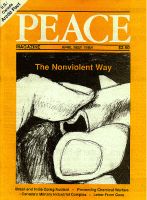Letters
By Sunshine Goldstream, Anna Briggs, Silas Townsend, Paul Eastwood, Andrew Van Velzen, Eric Tollefson, Alan Maxwell | 1988-04-01 12:00:00
Ask Soviets First
On March 27, 1987, Nei til atomvapen [peace group] received a letter from the Soviet embassy in Oslo, stating that vessels from the Soviet Navy would not carry nuclear weapons when visiting Norway. The Soviets said they would confirm that the vessels carried no nuclear weapons, providing the Norwegian government asked.
Let's request a similar declaration from the Soviets with respect to Canada's ports -- many of which are located in nuclear weapons free zones. Once we have the Soviets' agreement, let us take our request to the U.S., whose nuclear-capable vessels make many more Canadian port calls (87 such warships in Canadian ports in 1986, total 391 ship-days in 1986, roughly three times the previous 10 year average).
Write to the Soviet Embassy, 285 Charlotte Street, Ottawa K1N 8L5. Send a copy to Nanoose Conversion Campaign, Political Lobbying Committee, Box 6, R.R. 2, Arlington Rd., Nanoose, B.C. V0R 2R0, which is coordinating these efforts. NCC will keep you posted on the progress of the initial request to the Soviet government and welcomes your ideas.
Sunshine Goldstream, NCC Political Lobbying Committee, Nanaimo, B.C.
Watch Your Language
[Re: "Children Have Reason to Worry," Aug/Sept. 87] Someone should tell your editorial staff (or the staff at Der Spiegel) that the term "mongoloid" is not used anymore -- and also ask why you do not challenge the assumption that Downs Syndrome and other "deformed" fetuses are fair game for abortion. We can be clear that we condemn the nuclear world which increases the risk of genetic deformity, without accepting the uncritical view of the meritocratic world, that a less-than-perfect child loses the right even to be born. Such thinking is arguably what leads to the rule of technology over people in the first place.
Anna Briggs, Toronto
New Zealand Showdown?
A lot is going on in New Zealand, but there seem to be few signs of vigorous anti-nuclear activity. Last summer's election victory created a disposition to relax. New Zealanders, like other people, have lots of other problems to work on besides the nuclear arms race. Most of us would like to put it behind us and get on with living. It is dangerous, though, after little victories, to relax our efforts. The powers against us are too powerful. When tyrants determine how much the people will tolerate, that is exactly how much the people will be forced to tolerate.
Silas Townsend, Christchurch, New Zealand
Honest -- Boeing's Clean!
The Dec. 87/Jan. 88 issue of PEACE Magazine had an article by Colin McKinlay titled "MX Missile parts made in Canada." The article is incorrect on two major counts.
First, Mr. McKinlay claims that "scant media coverage is blamed for the peace movement's failure to notice the developments at the time." I'm sure that there was scant media coverage but, contrary to Mr. McKinlay's assertion, the peace movement did notice the bid by Boeing of Canada, Ltd. for production of the MX missile nose cone. There was, in fact, a fair amount of protest over this contract, including weekly vigils at the Boeing plant, letters to the government protesting Boeing's plans, and meetings with Boeing officials. Most of this was covered in the local media, as was the news that Boeing did not obtain the contract for the nose cone.
Mr. McKinlay's second error is his claim that Boeing is working on the nose cone of the MX missile. It is common knowledge that Boeing did not get this contract, but, in order to be thorough, I wrote Boeing and asked them about Mr. McKinlay's claims. Mr. G.B. Sampson, General Manager at Boeing of Canada, denied categorically the claims of the article printed in PEACE.
Paul Eastwood, Staffperson, Project Peacemakers
Did PEACE Sell Out?
Doug Roche should not be on the cover of a magazine that supports peace. This is the man who endorsed the U.S. cluster bombing of Libya.
Andrew Van Velzen, Toronto
No Post-INF Relaxing!
The signing of the INF Treaty was momentous -- but only in a symbolic sense. The three to four percent reduction in the excessive stockpiles of nuclear weapons is a small step.
However, the peace movement must not sit back and relax, as it did in the sixties after the superpowers agreed to halt atmospheric testing of nuclear weapons. Without serious objections being raised at that time, testing continued underground and the arms race went on unabated. The momentum evident in the signing of the INF Treaty could easily be lost. The peace movement needs to capture some of that momentum, and expand its efforts, especially in the next few months, to ensure that the proposed 50 percent reduction in strategic weapons is pushed with vigor.
Eric Tollefson, Calgary
No Longer Anti-Soviet
Until very recently I was what one might call a convinced anti-Soviet. However, under the Gorbachev policy of glasnost, so much appears to be changing for the better within the USSR that I am now far less skeptical. And that means I am ore willing to consider disarmament a workable first step on the road to world peace. As an example of the new openness, I note that Soviet spokesmen are now candidly admitting that in 1932-33 there was a great famine in the Ukraine, during which millions perished. This politically engineered catastrophe was previously denied by the Soviets and their apologists here in North America. A nation that can live up to its past, even such a holocaust as the great famine, is truly great. Keep up the good work, PEACE.
Alan Maxwell, Toronto
